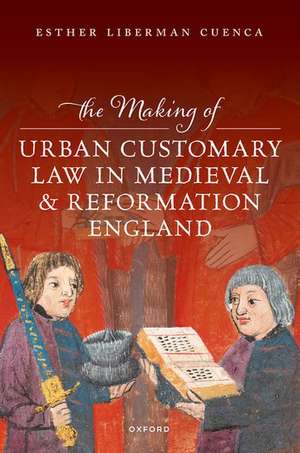The Making of Urban Customary Law in Medieval and Reformation England
Autor Esther Liberman Cuencaen Limba Engleză Hardback – 27 mar 2025
Preț: 593.97 lei
Preț vechi: 850.92 lei
-30% Nou
Puncte Express: 891
Preț estimativ în valută:
113.66€ • 123.84$ • 95.77£
113.66€ • 123.84$ • 95.77£
Carte nepublicată încă
Doresc să fiu notificat când acest titlu va fi disponibil:
Se trimite...
Preluare comenzi: 021 569.72.76
Specificații
ISBN-13: 9780198916772
ISBN-10: 0198916779
Pagini: 288
Dimensiuni: 156 x 234 mm
Editura: OUP OXFORD
Colecția OUP Oxford
Locul publicării:Oxford, United Kingdom
ISBN-10: 0198916779
Pagini: 288
Dimensiuni: 156 x 234 mm
Editura: OUP OXFORD
Colecția OUP Oxford
Locul publicării:Oxford, United Kingdom
Notă biografică
Esther Liberman Cuenca received her PhD in History from Fordham University and is Assistant Professor of History at the University of Houston-Victoria in Victoria, Texas. She is an editor of the undergraduate textbook, Law, Justice, and Society in the Medieval World: An Introduction through Film (Fordham Press, 2025), and her essays have appeared in Urban History, The Paris Review, Continuity and Change, and Historical Reflections/Réflexions Historiques. She has received fellowships and awards from the Mellon Foundation, Medieval Academy of America, and American Philosophical Society. In 2022/23, she was a Member at the Institute for Advanced Study in Princeton.
